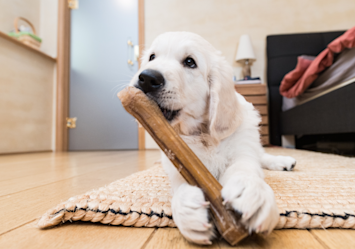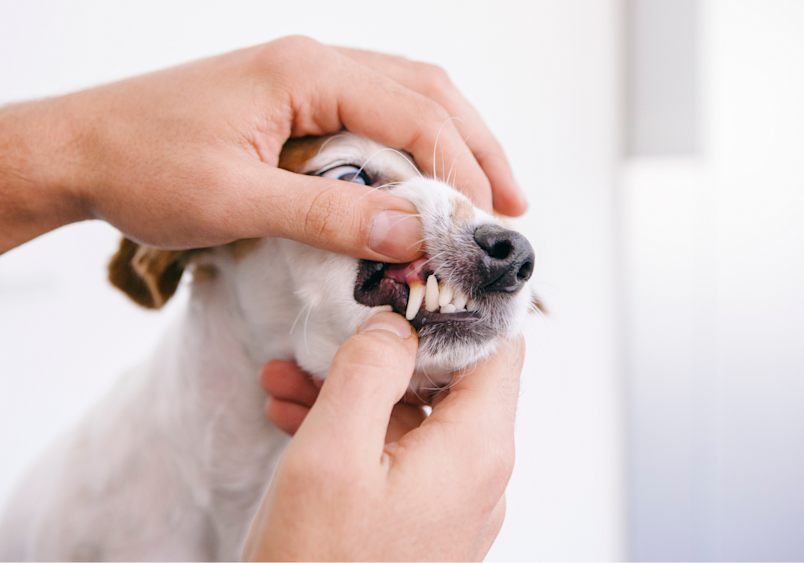
Bringing home a new puppy fills our hearts with joy - those adorable puppy kisses, wagging tails, and boundless energy make every day an adventure. But then comes puppy teething, a natural yet challenging phase that can test even the most patient pet parent.
While watching your furry friend navigate through their teething journey might feel overwhelming, understanding what to expect can make this temporary stage much more manageable. From timing to care tips, we'll guide you through everything you need to know about puppy teething and tooth loss.
When Do Puppies Start Getting Their Baby Teeth?
Just like humans, puppies are born with a set of deciduous teeth, also called "milk" or "baby" teeth, that are eventually replaced by permanent adult teeth. Unlike human babies who don't get their first teeth until several months old, puppies start developing their baby teeth remarkably early - around 2-3 weeks of age.
These first teeth to emerge are typically the incisors (front teeth) and canines (fangs), followed by the premolars. By 8-10 weeks old, most puppies have all 28 of their baby teeth, which will eventually be replaced by 42 permanent adult teeth.
Baby teeth in puppies can be surprisingly sharp, but thankfully, they don't last for long. Unlike humans, puppies normally only retain their baby teeth for a few months. There can be some variation due to size or breed, but puppy teeth usually start falling out around 4 months.
When Do Puppies Lose Their Baby Teeth?
The timeline for losing puppy teeth can vary depending on your puppy's breed and size. Generally, larger breed dogs tend to lose their teeth slightly earlier than smaller breeds. Here's a typical timeline:
First teeth to fall out: Incisors (front teeth) at 3-4 months
Canine teeth (fangs): 4-5 months
Premolars and molars: 4-6 months
Don't be alarmed if you rarely find any fallen teeth around your home - it's completely normal! Many puppies swallow their baby teeth while eating or playing, which is perfectly harmless.
Puppies typically start losing their baby teeth around 4 months old, and most will have lost all of their baby teeth by 6 months old. However, there is some variation between breeds and individual puppies. Smaller breed dogs may take longer to lose their baby teeth than larger breed dogs.
If your puppy still has baby teeth by 7 months old, you should take them to the veterinarian for a checkup. The veterinarian can check to make sure that the adult teeth are coming in correctly and that there are no retained baby teeth.
Retained baby teeth are teeth that do not fall out when the adult teeth come in. This can happen if the adult tooth is not positioned correctly or if the baby tooth is still firmly attached to the jawbone. Your veterinarian may recommend extraction of retained baby teeth to prevent dental problems later in life.
Signs Your Puppy Is Teething
Teething refers to the process by which the adult teeth begin to erupt through the gum and push out the smaller baby teeth. Common signs that your puppy is teething include:
Increased drooling
Red or swollen gums
Increased chewing behavior
Mild decrease in appetite
Slightly decreased energy
Mild oral bleeding
Whining or irritability
Visible gaps where baby teeth have fallen out
If you notice any more severe symptoms, such as extreme loss of appetite, low energy, pain during eating, or your puppy throwing up, please seek veterinary care.

Early Dental Care for Your Puppy’s Teeth
Just because your puppy's baby teeth will fall out, doesn't mean you should wait to start taking care of them. The time before teething is important for socialization and training; getting your puppy comfortable with being touched around the mouth and face at a young age will help desensitize them for the future. This is also a great time to get your puppy used to brushing their teeth!
Best Practices for Dental Health
Most dental diseases are caused by tartar and bacteria, which you can help prevent with good dental care. However, fractured teeth can also lead to similar problems. Large dogs, in particular, tend to be avid chewers and allowing this behavior is important for their dental AND mental health.
It is logical to think that giving a dog something hard to chew will help satisfy their needs but in fact it can pre-dispose a dog to dental fractures. Veterinary dentists usually recommend the thumbnail test – if you cannot dent a chew or toy with your nail, it is too hard.
Professional Dental Care and Maintenance
Tooth brushing is the gold standard for maintaining the health of your dog's teeth, but since it needs to be done at least every other day to be effective, training them early is the key to making this a lifelong habit. It only takes a day or two for bacteria to form calcified tartar on the outside of a tooth. Once this occurs, it is almost impossible to remove it without professional intervention.
The physical act of brushing prevents the bacteria from adhering to the tooth but has to be done with regularity. A toothbrush made specifically for dogs is a great tool since the heads are angled and made to fit in a dog shaped mouth. Finger brushes or even dental wipes are other great alternatives.
Most veterinarians recommend products that have been evaluated by the Veterinary Oral Health Council (VOHC) which is a group of board-certified veterinary dentists that evaluate dental products for their efficacy.
Managing Teething Behavior
During the teething period, puppies often become "mouthy." Chewing is an entirely normal behavior; it is how they interact with and learn about their environment. While teething, it can even help ease some of the discomfort of the gums. Unfortunately, shoes, furniture and other items can often become unwitting victims of destructive chewing during this time.
Safe Teething Solutions
Fortunately, there are many effective strategies to prevent and manage problematic puppy chewing behaviors during the teething phase. A proactive approach combining environmental management, appropriate toys, and training will help your puppy develop good habits while soothing their discomfort.
Puppy proofing your home by removing access to things like shoes, socks, human toys, etc.
Providing appropriate chew toys and treats
Using frozen toys to help soothe sore gums
Training commands like "leave it" or "trade"
Putting chewed toys in the freezer for a few hours can help a teething puppy by providing some relief for irritated gums. Avoid hard bones, antlers, rawhides and anything that is not obviously soft and flexible and always monitor them when they have a toy in case of choking.
How Pet Insurance Supports Your Puppy’s Dental Health
Your puppy's dental health journey begins even before their adult teeth erupt. Puppy teething is just the beginning of their oral health journey. Maintaining optimal oral health is crucial for their overall well-being. Puppy insurance with dental coverage can be a lifesaver, shielding you from unexpected costs associated with dental emergencies, such as a fractured tooth caused by a playful chew session.
You might think the question "When do puppies lose their baby teeth?" is the most pressing dental concern, but the bigger question is how to keep those brand-new grown-up teeth clean and prevent dental disease. Periodontal disease is a prevalent issue in dogs, leading to a host of problems: tooth decay, gum disease, and abscesses can cause significant discomfort. Bacteria from infected mouths can enter the bloodstream, potentially affecting vital organs. Even with the best intentions and daily brushing, dental issues can still arise. Pet insurance with dental coverage can provide financial relief, helping to cover the costs of treatments for more serious dental conditions including medications, extractions, and other procedures.
Starting coverage while your dog still has those puppy teeth ensures you're prepared for any dental emergencies that might arise, given that dental care is an important component of a dog's complete health maintenance routine.
You may also want to consider a non-insurance, optional wellness plan that includes dental care - it's an investment that can save you from unexpected costs down the road. This plan could help cover the cost of professional dental cleanings and other preventative services.
Teething Milestones: Your Puppy's Path to a Healthy Smile
While the puppy teething phase might seem challenging, remember it's just a temporary stage in your puppy's development. From those first tiny baby teeth at 2-3 weeks to a full set of adult teeth by 6-7 months, each milestone brings you closer to the end of teething.
With proper preparation, appropriate chew toys, and consistent dental care routines, you can help your puppy navigate this stage while building the foundation for excellent oral health throughout their life.
So enjoy this special time with your furry friend, knowing that soon, those pesky puppy teeth will be a distant memory, and you'll be back to those adorable puppy kisses, wagging tails, and boundless energy that make every day an adventure.